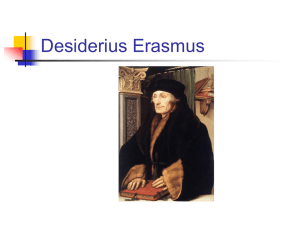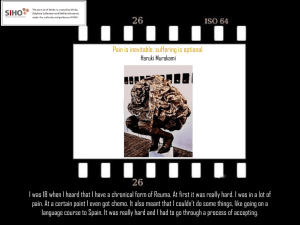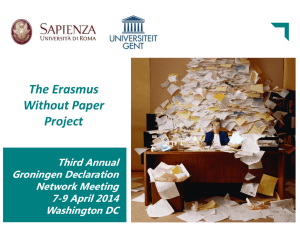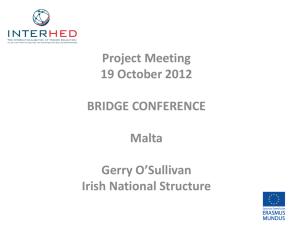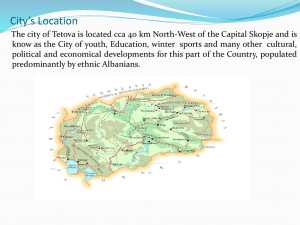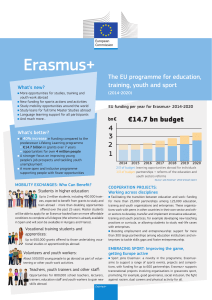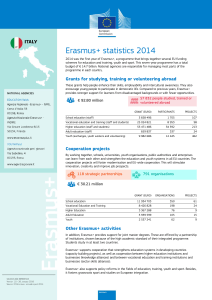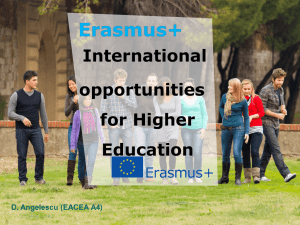What is Erasmus+
advertisement
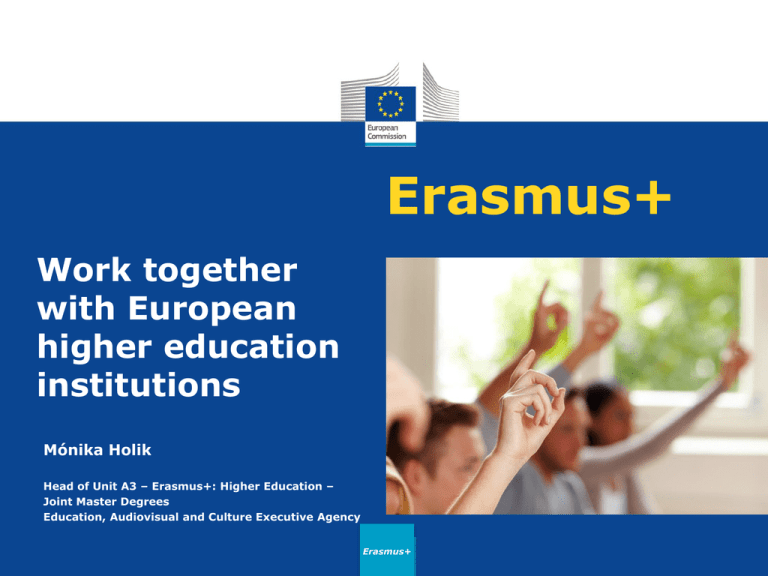
Erasmus+ Work together with European higher education institutions Mónika Holik Head of Unit A3 – Erasmus+: Higher Education – Joint Master Degrees Education, Audiovisual and Culture Executive Agency Erasmus+ What is Erasmus+ ? • The EU's programme to support education, training youth and sport • Funding for programmes, projects and scholarships • Fosters EU-EU and EU-international cooperation Erasmus+ 2014-2020 2007-2013 Erasmus Mundus Tempus Edulink ERASMUS+ EU-international 1 Learning Mobility Alfa Youth in Action Jean Monnet Erasmus 2 Cooperation Sport 3 Policy support Grundtvig Leonardo Comenius EU - EU Erasmus+ International cooperation between Programme Countries & Partner Countries Programme Countries Partner Countries EU Member States: All other countries throughout the world Austria, Belgium, Bulgaria, Croatia, Cyprus, Czech Republic, Denmark, Estonia, Finland, France, Germany, Greece, Hungary, Ireland, Italy, Latvia, Lithuania, Luxembourg, Malta, Netherlands, Poland, Portugal, Romania, Slovakia, Slovenia, Spain, Sweden, United Kingdom Other programme countries: Iceland, Liechtenstein, Norway, former Yugoslav Republic of Macedonia, Turkey. Erasmus+ Higher education opportunities for HE institutions from Partner Countries Credit mobility Joint Master Degrees Capacity Building for Higher Education Jean Monnet activities Other opportunities Erasmus+ Credit mobility Erasmus+ International strand to be launched in next Call for Proposals Credit mobility in brief • Short-term studies abroad that count to a degree back home • International opening of Erasmus • International strand to fund 135,000 scholarships for mobility with partner countries (2014-2020) • Mobility for Bachelor, Master and Doctoral students – and for staff Erasmus+ Credit mobility: how does it work? • Managed by Erasmus+ National Agencies in Programme Countries • Individual higher education institutions (HEIs) set up inter-institutional agreement(s) • Agreement sets framework for sending and hosting students and staff • 3 – 12 months for students • 1 week – 2 months for staff • 2 to 12 months for traineeships (from 2016 for partner countries) Erasmus+ Credit mobility: how to apply? • For universities: Only Programme-Country HEIs can apply to their National Agency to manage mobility agreements (Call to be launched autumn 2014) • International mobility agreements between Programme and Partner Countries will be selected in 2015) Students should apply via their university of origin Erasmus+ Joint Master Degrees Erasmus+ Joint Master Degrees in brief • Continuation of Erasmus Mundus Masters Courses • Excellent Joint Master courses offered by consortia of HEIs from Programme and Partner Countries to attract best students worldwide through high level scholarships • 350 Joint Master Degree courses to be selected, 2014-2020 • Expected to fund 25,000 students and staff over 7 years Erasmus+ Joint Master Degrees structure • offer an integrated study programme, fully recognised in the countries participating • require study in at least two of the Programme Countries represented in the consortium • can last 12 – 18 – 24 months (60 – 90 – 120 ECTS) • lead to the award of a double, multiple or joint degree to all successful students • award full-study scholarships for students from all over the world Erasmus+ Joint Master Degrees: how do they work? • Minimum consortium of 3 HEIs from different Programme Countries • HEIs from Partner Countries can take part • Funding for three annual intakes of students and guest academics, covering • Total costs of students scholarships • Annual flat-rate fee for management and guest academic costs Erasmus+ Joint Master Degree scholarships Contribution to participation costs Contribution to travel costs Students from partner countries Students from programme countries Up to € 9 000 per year Up to € 4 500 per year € 2 000 per year if less than 4 000 km from JMD coordinator € 1 000 per year € 3 000 per year if more than 4 000 km from JMD coordinator Contribution to installation costs € 1 000 Living allowance (max 24 months) € 1 000 per month Erasmus+ € 1 000 per month Joint Master Degrees: how to apply • For universities: Annual Calls for Proposals issued by EU • Programme-Country institutions may submit a proposal on behalf of an international consortium • Proposals assessed by experts on basis of relevance, quality of design, quality of team, impact and dissemination • Apply direct to EACEA: http://eacea.ec.europa.eu/erasmus-plus/funding_en Erasmus+ Joint Master Degrees: how to apply • For students: • Available master and doctoral courses are listed on EACEA website: http://eacea.ec.europa.eu/erasmus_mundus/funding/ available_partnerships.php • Select course and contry of interest and check deadlines • Apply directly to the university (consortia) Erasmus+ Capacity Building for Higher Education Erasmus+ Capacity-building for higher education: objectives To be launched in next Call for Proposals Build capacity and help modernise higher education institutions in Partner Countries, to ensure a structural, long-lasting impact •Support modernisation & internationalisation •Improve quality •Improve the level of competences and skills •Enhance management, governance in HEIs •Promote people-to-people contacts, intercultural understanding •Voluntary convergence with EU HE policy developments Erasmus+ Capacity-building for higher education in brief To be launched in next Call for Proposals 1.Joint Projects: New curricula, joint degrees, learning and teaching methodologies, staff development, quality assurance, governance, Bologna tools 2.Structural Projects: Reforms at national level with the support of the authorities in the Partner Countries (policy modernisation, Bologna policies, governance and management of higher education systems…) Erasmus+ Capacity-building for higher education • Partner Countries: Southern Mediterranean, Eastern Europe, Western Balkans, Russia, Asia & Central Asia, Latin America, Africa, Caribbean, Pacific (ACP) • Projects for Southern Mediterranean, Eastern Europe and Western Balkans countries may include an additional mobility component Erasmus+ Capacity-building for higher education: how does it work? • Projects of 2 or 3 years • Projects run by consortium of institutions • Consortium must include Programme Countries and Partner Countries • Project can be coordinated by an institution from a Programme or a Partner Country Erasmus+ Capacity-building for higher education: how to apply • Annual Calls for Proposals issued by EU • Proposals assessed by experts on basis of relevance, quality of design, quality of team, impact and dissemination • Applications may be from an institution in a Partner or Programme Country • Apply direct to EACEA: http://eacea.ec.europa.eu/erasmus-plus/funding_en Erasmus+ Jean Monnet Activities Erasmus+ Jean Monnet in brief Focus on EU studies to promote excellence in teaching and research on the European integration process in various disciplines Objectives: •Equip students and young professionals with knowledge of EU subjects •Stimulate teaching and research on the European Union •Foster dialogue between the European Union and the world in higher education Erasmus+ Jean Monnet: how does it work? Project grants to promote excellence through: •Teaching and research (Modules, Chairs, Centres of E xcellence) •Policy debate with academic world (Networks, Projects) •Support to activities of institutions or associations Erasmus+ Jean Monnet: how to apply? • Annual Calls for Proposals issued by EU • Applications may be from an institution in any country of the world • Only one applicant institution but informal involvement of partner institutions is possible (particularly for networks) • Proposals assessed by experts on basis of relevance, quality of design, quality of team, impact and dissemination • Apply direct to EACEA: http://eacea.ec.europa.eu/erasmus-plus/funding_en Erasmus+ Capacity-building in the fild of Youth Open Call for proposals (02/09/2014) Capacity Building projects in the youth field (under Key Action 2) promote cooperation and mobility activities that have a positive impact •on the qualitative development of youth work, youth policies and youth systems •as well as on the recognition of non-formal education in Partner Countries, notably in African, Caribbean and Pacific (ACP), Asian and Latin American countries; Erasmus+ Capacity-building in the field of Youth Activities should: •promote strategic cooperation between youth organisations – and public authorities; – organisations in the education and training fields; – business and labour market; Erasmus+ Capacity-building in the fild of Youth And… •raise the capacities of all organisations involved (youth organisations, youth councils, youth platforms and local, regional and national authorities dealing with youth) Erasmus+ Capacity-building in the fild of Youth • Open Call: EAC/S11/13 • Deadline of submission: 02/09/2014 - 12:00 (CET/CEST, Brussels time) • More information on EACEA website: http://eacea.ec.europa.eu/erasmus-plus/funding/key-action-2-cooperationfor-innovation-and-exchange-good-practices-capacity-building-in-fieldyouth-round2_en Erasmus+ More information: Information on Erasmus+ http://ec.europa.eu/programmes/erasmus-plus/index_en.htm Information on Erasmus+ funding opportunities http://eacea.ec.europa.eu/erasmus-plus/funding_en Erasmus+
